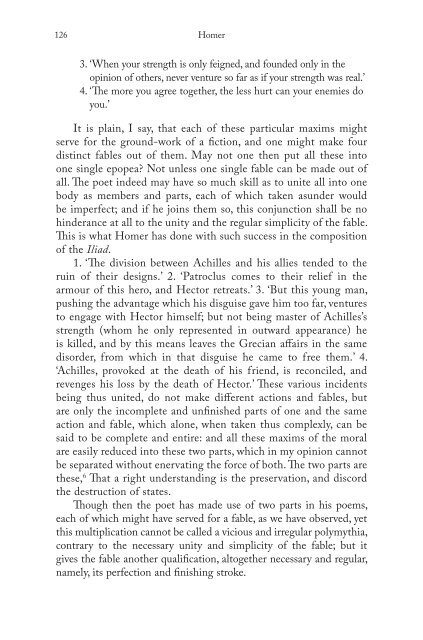Blooms Literary Themes - THE TRICKSTER.pdf - ymerleksi - home
Blooms Literary Themes - THE TRICKSTER.pdf - ymerleksi - home
Blooms Literary Themes - THE TRICKSTER.pdf - ymerleksi - home
You also want an ePaper? Increase the reach of your titles
YUMPU automatically turns print PDFs into web optimized ePapers that Google loves.
126<br />
Homer<br />
3. ‘When your strength is only feigned, and founded only in the<br />
opinion of others, never venture so far as if your strength was real.’<br />
4. ‘The more you agree together, the less hurt can your enemies do<br />
you.’<br />
It is plain, I say, that each of these particular maxims might<br />
serve for the ground-work of a fiction, and one might make four<br />
distinct fables out of them. May not one then put all these into<br />
one single epopea? Not unless one single fable can be made out of<br />
all. The poet indeed may have so much skill as to unite all into one<br />
body as members and parts, each of which taken asunder would<br />
be imperfect; and if he joins them so, this conjunction shall be no<br />
hinderance at all to the unity and the regular simplicity of the fable.<br />
This is what Homer has done with such success in the composition<br />
of the Iliad.<br />
1. ‘The division between Achilles and his allies tended to the<br />
ruin of their designs.’ 2. ‘Patroclus comes to their relief in the<br />
armour of this hero, and Hector retreats.’ 3. ‘But this young man,<br />
pushing the advantage which his disguise gave him too far, ventures<br />
to engage with Hector himself; but not being master of Achilles’s<br />
strength (whom he only represented in outward appearance) he<br />
is killed, and by this means leaves the Grecian affairs in the same<br />
disorder, from which in that disguise he came to free them.’ 4.<br />
‘Achilles, provoked at the death of his friend, is reconciled, and<br />
revenges his loss by the death of Hector.’ These various incidents<br />
being thus united, do not make different actions and fables, but<br />
are only the incomplete and unfinished parts of one and the same<br />
action and fable, which alone, when taken thus complexly, can be<br />
said to be complete and entire: and all these maxims of the moral<br />
are easily reduced into these two parts, which in my opinion cannot<br />
be separated without enervating the force of both. The two parts are<br />
these, 6 That a right understanding is the preservation, and discord<br />
the destruction of states.<br />
Though then the poet has made use of two parts in his poems,<br />
each of which might have served for a fable, as we have observed, yet<br />
this multiplication cannot be called a vicious and irregular polymythia,<br />
contrary to the necessary unity and simplicity of the fable; but it<br />
gives the fable another qualification, altogether necessary and regular,<br />
namely, its perfection and finishing stroke.

















